Top 5 things that attract rodents
Rodents are definitely a pest you do not want to find in your home. Rats and mice spread more than 35 different diseases, including Salmonella, rat-bite fever, murine typhus, infectious jaundice, and the plague. They also cause major damage each year by chewing through wood, drywall, and insulation and causing fires by chewing through electrical wires.
Here are 5 things that attract mice and rats to your home:
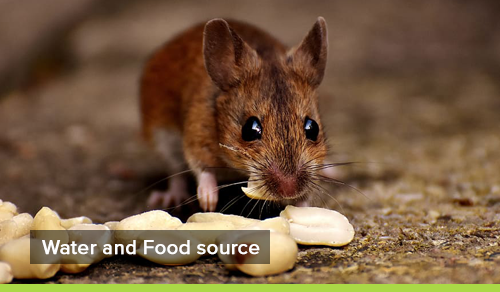
Water and Food source
Food is one of the most common reasons a rat or a mouse will enter your home. These rodents are always searching for a stable source of food, which is why they will even feast on unsealed garbage cans and leftovers on a kitchen counter. Rats are attracted to anything: meat, vegetables, nuts, soap, leather etc. but their favourite foods are said to be peanut butter, chocolate and bacon (not cheese). Make sure all the food in your home, especially dry stock in bags like pet food and other bulk items, is stored well in airtight containers. If you have food left in thin plastic bags or cardboard boxes, mice and rats can easily chew through the packaging and feast on your food. Leaving food scraps, fruits, seeds, etc. in unsecured trash bags or bins is welcoming for rats and mice, so make sure to invest in outdoor garbage cans with tight-fitting lids. Rodents love a wide range of various seeds and grains and fruit trees so check your yard for any rotted fruit and throw it away as soon as possible. Some rats can switch to a high-protein diet that requires them to hunt for insects, meat scraps, and smaller rodents like mice.
Small leaks in the water pipes are also an opportunity for rats to secure a stable water source, so ensure that all the pipes and hoses around the house are fixed. The same goes for outdoor pet water bowls, birdbaths, anything with consistent clean water and have easy access attract rats and mice into your home.
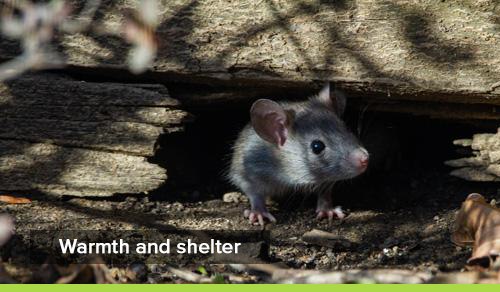
Warmth and shelter
When the temperature begins to drop, rodents are the most common pests we see in the winter. Just like humans, rats are warm-blooded, so they need to find warm places to make their nests and raise their young. Rats, mice, and squirrels will invade our homes in search of a warm place to stay and an ample supply of food and water. They will do everything they can to enter a warm home and build a nest near the heating systems and other appliances. This can cause the appliances to short circuit or become damaged.
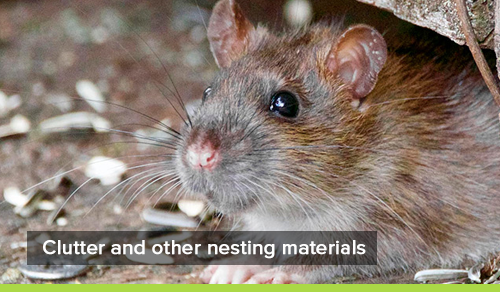
Clutter and other nesting materials
Mice thrive in unkempt conditions, and a cluttered area is the perfect nesting location for their family. Rodents actively seek out cluttered spaces. Any space in your house that offers warmth and is hidden from plain sight attracts rats and mice. In homes, cluttered areas tend to be garages, attics, and small storage spaces. Since firewood can also attract rodents, avoid storing it directly on the floor or up against the walls where it can provide easy access for a rodent.
In addition, offices can also be a breeding ground for mice; boxes, stacks of paper, and desk drawers filled with snacks are all popular nesting sites. Keep organized, clean and dust regularly, and get rid of unused stuff.
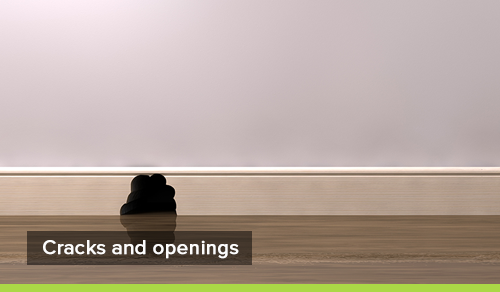
Cracks and openings
Make sure to regularly inspect around the home for gaps that these pests may use to get inside. Mice can squeeze into a tiny hole the size of a dime. First, check the exterior of your home for any cracks and holes. Seal these with materials that are hard for them to chew, such as caulk or wire mesh/wool to keep rodents, and other pests, from sneaking inside. You should also cover your vents with screens and get a chimney cover to keep them from coming in from above.
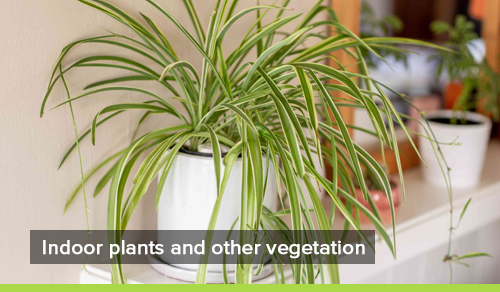
Indoor plants and other vegetation
Growing plants indoors becomes an ideal place for rats to take up residence. Especially if these plants are fruit-bearing, the plant becomes a great nest. There’s always water, there’s food, and the soil is warm because it lives inside your house.
Tall weeds, bushes, piles of windblown leaves, and other debris in your yard and around the foundation of your home also attracts mice and rats or mask their activities. Tall trees with branches that extend to the roof also serve as a pathway for roof rats to enter the home’s attic.
These plants can also provide the pests with nesting materials. Rats who live outside typically use grasses and twigs to build their homes.
Solutions
There are some home remedies to help you with your rodent problem like setting bait traps or wooden mouse traps around the house. You can also place things that rats and mice hate the smell of such as cut onions, mothballs, eucalyptus oil, ammonia or some sprays like Peppermint Pest Control spray.

Call a pest control company
If you see a sign of a mouse, there’s a high chance there’s more. Rats and mice can breed rapidly, so it’s important that you get rid of the as quickly as possible. Competitive pest services are high trained to help you identify and find a solution to your pest problem. Call us today at 1300 766 614

WE'RE NOT HAPPY UNLESS YOU'RE HAPPY
SEE HOW IT WORKSWith Competitive Pest Control Services you’ll never have to worry about paying for a job that hasn’t been done.
If you’re not satisfied with our services, we’ll not only give you your money back, we’ll return it to you twofold. That’s right: you’ll not only receive a full refund, we’ll also pay to have your pest problem sorted by our competition.*
We’re always trying to raise the standard of service, it’s one of the reasons we were name Australian Pest Manager of the Year four times in the past six years. When you employ our services, you know your pest problem will soon be a distant memory. What could be more satisfying than that?
*Please contact us to hear more about our 200% Money Back Guarantee - as due to issues sometimes outside our control, not all services may be covered by this offer.





 Instagram
Instagram  LinkedIn
LinkedIn